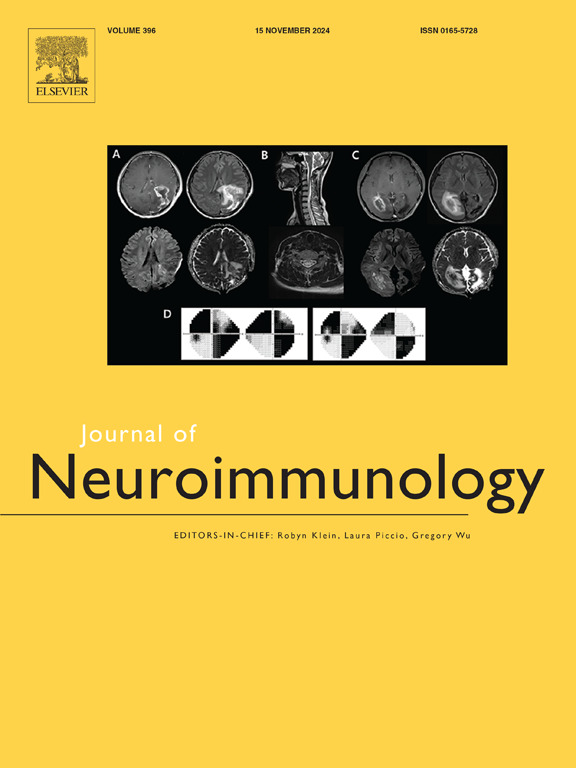双滤过血浆置换术在降低神经免疫性疾病患者免疫球蛋白和罪魁抗体水平方面的疗效:中国单中心回顾性分析
IF 2.9
4区 医学
Q3 IMMUNOLOGY
引用次数: 0
摘要
本研究旨在评估双滤过血浆置换术(DFPP)在降低神经免疫性疾病患者免疫球蛋白和罪魁祸首抗体方面的效果。方法对 51 名接受过 DFPP、免疫疗法和对症治疗的神经免疫性疾病患者进行了回顾性分析。对治疗前和治疗后的免疫球蛋白和抗体水平进行了测定,并使用改良Rankin量表(mRS)、残疾状况扩展量表(EDSS)、自身免疫性脑炎临床评估量表(CASE)和重症肌无力专用量表等量表对神经功能进行了评估。结果队列中包括神经脊髓炎视谱系障碍(NMOSD)、自身免疫性脑炎(AIE)、重症肌无力(MG)、抗髓鞘少突胶质细胞糖蛋白相关疾病(MOGAD)和副肿瘤性神经综合征(PNS)患者。DFPP 可使免疫球蛋白水平(IgG、IgA、IgM)明显降低 70%。大多数患者的抗体滴度下降,神经功能明显改善。治疗后,mRS 评分中位数从 2(IQR 2-3)分降至 1(IQR 1-2)分,并在 90 天后进一步改善。在NMOSD、MOGAD、AIE和MG的不同量表中均观察到明显改善。结论DFPP能有效降低免疫球蛋白和抗体水平,从而改善神经免疫性疾病的神经功能。为证实这些研究结果,有必要开展进一步的大规模研究。本文章由计算机程序翻译,如有差异,请以英文原文为准。
Effectiveness of double-filtration plasmapheresis in reducing immunoglobulin and culprit antibody levels in neuroimmune disorders: A single-center retrospective analysis from China
Objective
This study aims to evaluate the effectiveness of double-filtration plasmapheresis (DFPP) in reducing immunoglobulins and culprit antibodies in neuroimmune disorders.
Methods
A retrospective analysis was conducted on 51 patients with neuroimmune diseases treated with DFPP, immunotherapy, and symptomatic treatment. Immunoglobulin and antibody levels were measured pre- and post-treatment, along with neurological function assessments using scales like the modified Rankin Scale (mRS), Expanded Disability Status Scale (EDSS), Clinical Assessment Scale for Autoimmune Encephalitis (CASE), and Myasthenia Gravis-specific scales.
Results
The cohort included patients with neuromyelitis optica spectrum disorder (NMOSD), autoimmune encephalitis (AIE), myasthenia gravis (MG), anti-myelin oligodendrocyte glycoprotein associated disease (MOGAD), and paraneoplastic neurological syndromes (PNS). DFPP significantly reduced immunoglobulin levels (IgG, IgA, IgM) by ∼70 %. Most patients showed decreased antibody titers and significant neurological improvement. The median mRS score improved from 2 (IQR 2–3) to 1 (IQR 1–2) post-treatment, with further improvement at 90 days. Notable improvements were observed across various scales specific to NMOSD, MOGAD, AIE, and MG. Minor adverse events were reported, with no serious adverse events.
Conclusions
DFPP is effective in reducing immunoglobulin and antibody levels, leading to improved neurological function in neuroimmune disorders. Further large-scale studies are warranted to confirm these findings.
求助全文
通过发布文献求助,成功后即可免费获取论文全文。
去求助
来源期刊

Journal of neuroimmunology
医学-免疫学
CiteScore
6.10
自引率
3.00%
发文量
154
审稿时长
37 days
期刊介绍:
The Journal of Neuroimmunology affords a forum for the publication of works applying immunologic methodology to the furtherance of the neurological sciences. Studies on all branches of the neurosciences, particularly fundamental and applied neurobiology, neurology, neuropathology, neurochemistry, neurovirology, neuroendocrinology, neuromuscular research, neuropharmacology and psychology, which involve either immunologic methodology (e.g. immunocytochemistry) or fundamental immunology (e.g. antibody and lymphocyte assays), are considered for publication.
 求助内容:
求助内容: 应助结果提醒方式:
应助结果提醒方式:


